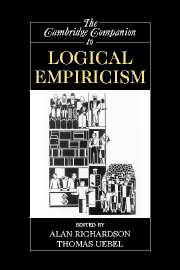Book contents
- Frontmatter
- Introduction
- Part I The Historical Context of Logical Empiricism
- Part II Logical Empiricism: Issues in General Philosophy of Science
- Part III Logical Empiricism and the Philosophy of the Special Sciences
- Part IV Logical Empiricism and its Critics
- 12 Wittgenstein, the Vienna Circle, and Physicalism: A Reassessment
- 13 Vienna, the City of Quine’s Dreams
- 14 “That Sort of Everyday Image of Logical Positivism”: Thomas Kuhn and the Decline of Logical Empiricist Philosophy of Science
- Bibliography
- Index
- Series List
13 - Vienna, the City of Quine’s Dreams
from Part IV - Logical Empiricism and its Critics
Published online by Cambridge University Press: 28 January 2008
- Frontmatter
- Introduction
- Part I The Historical Context of Logical Empiricism
- Part II Logical Empiricism: Issues in General Philosophy of Science
- Part III Logical Empiricism and the Philosophy of the Special Sciences
- Part IV Logical Empiricism and its Critics
- 12 Wittgenstein, the Vienna Circle, and Physicalism: A Reassessment
- 13 Vienna, the City of Quine’s Dreams
- 14 “That Sort of Everyday Image of Logical Positivism”: Thomas Kuhn and the Decline of Logical Empiricist Philosophy of Science
- Bibliography
- Index
- Series List
Summary
Having finished his doctorate in two years, W. V. O. Quine made a beeline for Vienna. This was 1932, and the object of his visit, Rudolf Carnap, had already gone on to Prague. After a few months of attending Moritz Schlick's lectures and meetings of the Vienna Circle, Quine too went on to Prague. He was not to return to Vienna for over 35 years, not, in fact, until he delivered “Epistemology Naturalized” (Quine 1969) as a lecture there in 1968. In the meantime Quine acquired, and indeed cultivated, a reputation for rejecting, some would say refuting, everything that was central to the new Viennese philosophy.
Here I want to challenge that picture. Quine did arrive in Vienna in 1932, but intellectually at least he never left. Quine tended to identify the Vienna Circle with Carnap. The Vienna that I am talking about is broader and more heterogeneous. Quine is rarely seen as a historian, but his historical picture of the Circle and of Carnap has been enormously influential, and his historical writing plays a crucial role in his argument for his nonhistorical views. Second, Quine's own views have direct Viennese antecedents, or if not, the arguments for them do. And finally, the views for which Quine was most famous were modified over the years, specifically in Carnap's direction. In short, Vienna remained the city of Quine's dreams; it was the home of his concerns, the source of his arguments, and the lodestar of his aspirations.
VIENNA
What I mean by “Vienna” of course is the Vienna Circle. And this is a broad and varied tradition. Naturally, the city has other long-standing and distinguished philosophical traditions. Generally, those traditions seem to have been of an empiricist sort, Aristotelian and sometimes Thomist. That is not surprising, given the redominance of Catholicism. Brentano and his school were well established in Vienna (and in Poland), and I say that despite Brentano’s having been born in Germany, leaving the priesthood, and spending most of his time in Vienna as privatdocent rather than as professor. But if we take Viennese philosophy so broadly as to include the whole Aristotelian tradition, then the idea that Quine fits somewhere in such a wide spectrum would hardly be worth considering.
- Type
- Chapter
- Information
- The Cambridge Companion to Logical Empiricism , pp. 332 - 345Publisher: Cambridge University PressPrint publication year: 2007
- 4
- Cited by



